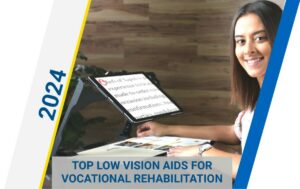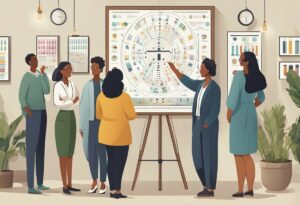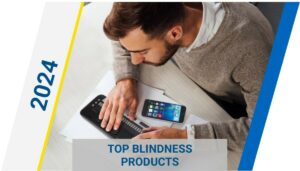What Role Does Diet Play with Macular Degeneration?
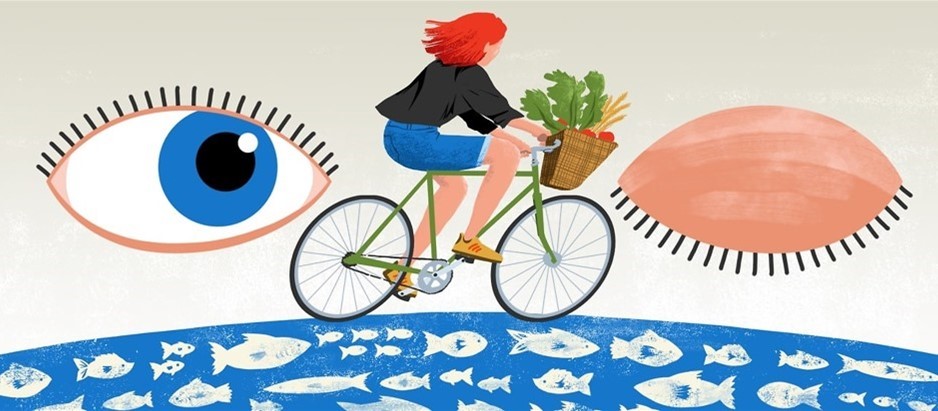
Question: What should I be eating or not eating to hopefully slow the progression of Macular Degeneration?
Answer: Research shows following a Mediterranean diet can be highly beneficial to those with age-related Macular Degeneration. The Mediterranean diet, if followed, can reduce development and progression to late AMD by as much as 41%! Following a Mediterranean diet can also be beneficial to our heart and brain.
The impact of diet for age-related Macular Degeneration
Question: Well, I already have age-related Macular Degeneration, so can a diet really help me now?
Answer: Yes! If we have early to intermediate age-related Macular Degeneration, it can help us keep what we have versus going into late-stage age-related Macular Degeneration. Another benefit is we will almost certainly lose weight and become more fit and healthy. Maybe we will be able to fit into those cool old jeans in the back of the closet again?
The Mediterranean diet
The Mediterranean Diet consists of a good amount of vegetables, legumes, good grains, olive oil, and oily fish like salmon. The green leafy vegetables and the fish are very important. Also, avoiding excess amounts of highly processed refined foods and sugar are deemed important.
Diet changes are intimidating – believe me, I know
Question: OK, who is intimidated by revamping their own personal diet?
Answer: Well, I am seriously intimidated with the idea of changing up what and how I eat. We’re talking about me, a knuckle-dragging Neanderthal with 7 decades of bad habits… that’s who! I know it may sound like I’m kidding and I am… sort of. But with my central vision on the decline (I’ve had age-related Macular Degeneration, wet in one eye and dry in the other for 9 years now) I am ready to give myself the best chance of maintaining the vision I have!
Getting a macular degeneration diagnosis
9 years ago… Needing what I thought were new glasses, I went to my optometrist for a new pair of glasses. During the standard eye exam the optometrist discovered some shadowy areas in my macula. He referred me to an RS (retina specialist) for further testing. And that my friends, was when this wild ride began.
How did I feel being newly diagnosed, you ask?
Well, I guess you could say I experienced shock, fright and confusion. Much like all of you, when you guys found out. I remember the RS telling me that I would need injections for my wet eye! Holy mackerel (another good oily fish for our new diet ::smile::) he was going to stick a needle in my eyeball? On a regular basis? Oh my!
The many questions I had when newly diagnosed
Why us? I thought this kind of stuff only happened to the other guy!
When I remember back to my first few months after being diagnosed, I was struggling with many questions:
- I have a disease that can’t be cured? (Later understanding that the current treatment is meant to hold our disease at bay, so to speak.)
- Vitamins!!? This high-powered doctor is telling me to take certain vitamins? (The AREDS 2 formula, we later found out). What happened to magical medicine from the all-knowing and all-seeing “super doc”? Vitamins! Sheesh!!!
Reasons for hope
Back to the present time, and the good news is we can improve our health through lifestyle changes, particularly a healthy diet and exercise. And these changes are good for other parts of our body besides our eyes. We are all rooting for the many clinical trials and studies that are ongoing for our shared plight. We have a reason for hope and we also have each other to console, support, and learn from. I wish us all well on our health journey.
This article was published on January 15, 2021, by MacularDegeneration.net and authored by Richard Hallberg. <Click here> to read the original article.
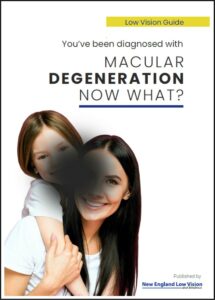 If you or a loved one has been diagnosed with Macular Degeneration, we have created this 12-section Low Vision Guide – a free resource to help you or loved one who has been diagnosed with Macular Degeneration. <Click here> to access.
If you or a loved one has been diagnosed with Macular Degeneration, we have created this 12-section Low Vision Guide – a free resource to help you or loved one who has been diagnosed with Macular Degeneration. <Click here> to access.
About New England Low Vision and Blindness
New England Low Vision and Blindness uniquely brings hope through technology, training, and care. We are a full-service assistive technology rehabilitation training provider. We offer nearly 100% of all major electronic low vision, blindness, and software products, multiple assistive technology showrooms and a team of Vision Technology Rehabilitation Trainers to help anyone who is visually impaired.
We provide ‘patient choice’ showcasing numerous technology options from the world’s most respected suppliers, all in line with one’s individualized budgetary limits and personal, educational, or professional goals. We also provide custom training solutions and troubleshooting support.
Widely known, tested, and trusted throughout New England, our team brings 75+ years of low vision experience. Our talent, technology, and training offerings are unmatched and highly respected. We are an extremely unique and extraordinary resource for anyone suffering from vision loss in New England. We are here to help.
Through our no-obligation demonstrations – either at one of our conveniently located assistive technology showrooms or in their home, office, or school – clients experience a relaxed 2-hour free personal demonstration of almost 100% of all low vision and blindness technologies available on the market.
To learn more about how we Bring Hope to people who are blind or with low vision, contact a Technology Specialist at New England Low Vision and Blindness please call our toll-free number 888-211-6933 or email us at info@nelowvision.com. You can also use the form above to request information about our services or a no-obligation demonstration on this or any of our products.

